Sapta Sagaradaache Ello Director Hemanth M Rao: 'Love Demands Vulnerability'
The maker of this year's most unforgettable Kannada film yet, speaks with Subha J Rao of bringing the poignant story to screen.
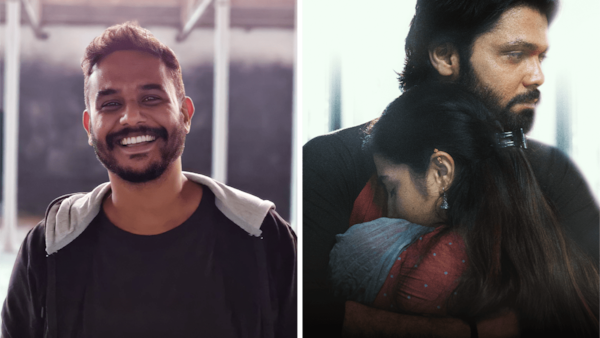
Last Updated: 01.45 PM, Oct 01, 2023
THERE’s a heaviness in your heart; you’re restless and wonder why fate seems aligned against Manu and Priya. And long after the end-credits roll, you write another ending for Sapta Sagaradaache Ello — Side A in your head.
The Kannada film — directed by Hemanth M Rao and co-starring Rakshit Shetty and Rukmini Vasanth — has entered its third week in Karnataka’s theatres, while its Telugu version has worked the same magic in the neighbouring states.
On social media, the ache-filled tweets we saw a fortnight ago for SSE are being repeated for Sapta Sagaralu Dhaati, the Telugu version. That’s the effect Hemanth’s film has had on people.
Now imagine the pain that Hemanth would have carried around since 2006, knowing what’s going to happen to his protagonists. But like all good things, the idea needed to stew in his heart, and get written as a proper script once he had age and lived experience on his side.
In a winding conversation, Hemanth speaks about how SSE came into being, how he lived and worked on other films while this magnum opus silently took shape within him, Rakshit’s role in the making of the movie, and basking in the audience’s love. Edited excerpts:
Our bond with Manu and Priya is but a few weeks old. Even then, we feel their pain. You’ve lived with them for 15-odd years. Did you feel pain while putting their lives through the wringer during the writing?
I am very connected to the characters, and I’ve worked on them for a very long time. With every passing year, your perception about relationships changes. That, in turn, affects how you see your characters. You infuse them with the maturity you develop with time.
As for the pain, yes, I did feel it. In some rare cases, you end up living that character. It is a rather difficult thing to do, but then you remember it is not often that something like this happens.
For instance, Godhi Banna Sadharana Mykattu forced me to re-examine my relationship with my dad and try to understand why I felt a certain way. It made me examine the dynamics of a father-son relationship from a personal vantage point, and that helped the film and me. It strengthened my relationship with my father.
But Kavaludaari and SSE have characters that are outside of my reality. They are people that I’ve created and as a writer, I am the master of those puppets. But that’s a delicate area too, as you can get lost yourself while trying to make their lives difficult. You can’t enjoy that process. If you start doing that, the pathos is not organic.
In this case, as writers, Gundu Shetty and I have strived to keep it as real and rooted as possible. The premise is this: Life takes away something very dear to you. How will you react?
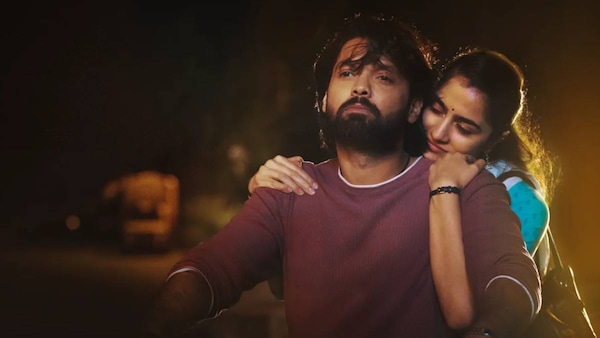
The genesis of the movie is a crime scene, you’ve said.
Yes, this happened sometime in March 2006. It was a hit and run case, and a traffic police official Arun Kumar passed away on Cubbon Road in Bengaluru. I was returning from a film and saw a car sort of speed away when the cop tried to stop it. He was gone in minutes. Like in films, the driver did not go to prison. That incident shook me.
And then I thought of the person who took the fall, and what his life would be like. That is what you see today as SSE.
This was supposed to be my first film, but I don’t think I had the maturity then to do something with this level of gravitas. I needed to build on my ability as a filmmaker and better my craft and scene construction. I needed the maturity of this age, and had to learn how to deal with certain aspects of grief. My decision-making then would have been very different.
The passage of time is what burnished this movie — it added a huge element based on how I look at life, relationships and my learnings along the way.
There is very little bravado in SSE. The love is tender, sometimes playful, and almost always vulnerable. That is quite going against the grain.
There is a certain amount of vulnerability that love demands of you, right? It could be a pet, a friend, your partner, parents, anyone. You need great courage to be vulnerable. The natural instinct is to not expose oneself, to protect oneself. The film deals with all these emotions and that allowed me to be vulnerable in the writing.
Are you among those directors who looks forward to watching the movie with the audience? Do you wait to see their reactions?
Not quite. I do watch parts of the film with the audience for the first three days, and then detach and withdraw into my world. It is no longer my film. I don’t own it, so it can find its home in those watching it.
I don’t want to know which notes hit, where they laughed, where they wept. The magic is in not knowing that. For me, it is sacrosanct to maintain that distance. There are certain things I am better off not knowing. It allows me to be naive and innocent and not pander to what I think will work or not.
This time alone, I cannot switch off. Because Side B releases in October and I am working on it. I am still half-connected to the film.
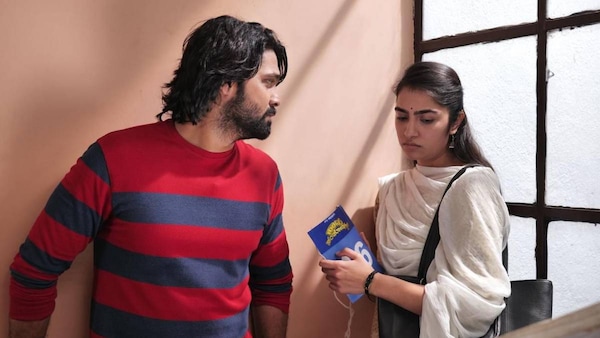
For a film that was marketed as a love story, it was interesting how you did not show them falling in love, just being in love. Strangely, no one missed their past.
That took a lot of work — to showcase a couple who have natural affinity and chemistry in their present without a hint of their past. But, is life not like that? When you see people in love on the street, malls… you can just tell they are in love by seeing how they are in the now. You buy the idea that they are together and into each other, regardless of gender.
We were conscious to not get into the origin story as such. It had been written and both Rakshit and Rukmini had absorbed it during the workshops we had. That helped you buy the now, without worrying about the then.
How did you all prep for this?
When I went to the lead actors with this material, I requested that we be vulnerable with each other, and we created a safe space for us to bond. I created a backstory for Manu and Priya and there was a lengthy questionnaire I gave them, as to how Manu and Priya would respond. Who will be the one to patch up? Who has anger issues? What kind of touch is Priya comfortable with? What is their love language? And without that investment from the actors, we would (not) have got the audience to instantly believe that these are two people crazily in love. That hard work ensured that we were able to sell a story that began mid-way.
When did you take the decision to dub in Telugu?
Not just Telugu, we meant to keep the film ready in Telugu, Tamil, Malayalam and Hindi. We decided upon a Telugu release, because we noticed that all the Hyderabad shows were going houseful from day three and that not just Kannadigas, even Telugu-speaking people loved it.
The team believed the film has to travel on its own, which is why we did not make any pan-India plans. We wanted to go where the film takes us.
Now, digitally it will be available in all these languages, and the dubbing has been done with care, to keep it as close to the original as possible.
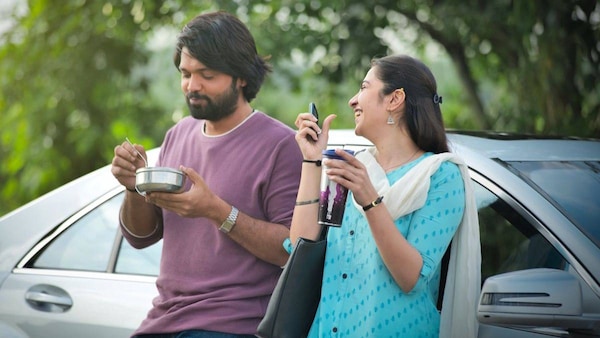
Rakshit and you have collaborated before (on Godhi Banna…). How you found Rukmini is an interesting story.
I am just glad she messaged me, and gladder still that I opened that Instagram request. I saw her profile, and just knew that this is the Priya I have been searching for. I just felt she would be perfect. I only needed to know if she could act. I then found out she’s a trained actor. I just needed to understand her process, because that is central to her preparation.
We needed to get to a point when she knows where I come from, where the writing comes from. Rukmini is incredibly skilled and the environment on the sets allowed her to come out and push herself.
Rakshit helped too. He’s a very generous actor, who is there for every reaction shot, who happily gives dialogue cues. He’s grounded and a student of cinema. His process makes you feel very welcome.
What did you mean by the set as a safe space?
The concept of a creative space. Where artistes can be child-like and feel good about their work. When that happens, people are excited to come to work, to give their best. Sometimes, situations are high-stress and demanding, and when you offer a safe creative space, it dulls the sharp edges.
This safe space ensures they are not watched while being vulnerable, are not judged, where every mistake is not pounced on… where they know it is okay to screw up.
In this space, you give time for the artistes to prep, the cinematographer time to figure the lighting. I cannot give Advaith (the cinematographer) little time and expect beauty.
By itself, filmmaking is a process of letting go of control, and entrusting many jobs to many people and believing they will take care of it.
You have to give them space and time to get there. This space is very important for creative collaboration.
That 543 tape recorder and the Reynolds pen were pure nostalgia…
It was the production director Ullas Hydur’s eye. I wanted a specific type of tape recorder, and showed him some pictures, he managed to source this. The minute I saw it, I immediately felt like a piece of me was there in the recorder.
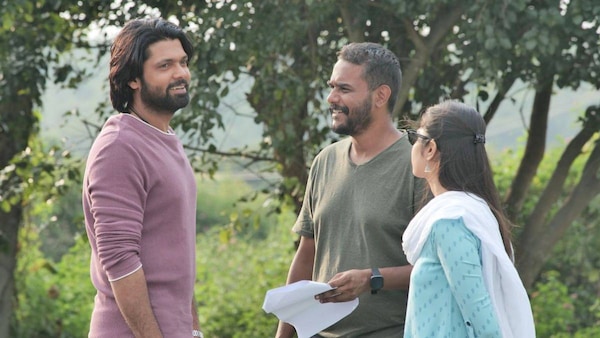
What gives you the greatest joy in the filmmaking process?
The making of a film. It is not the publicity, not the applause — those are very important, but I am happiest on the set and during post-production. I come alive then, despite being very introverted. Promoting a film is a duty and I do it with that sense.
I know you’re an introvert and don’t really relish promotions, but your face lit up when you were asked well-thought-out questions in some interactions.
It is very refreshing when that happens, because it is rare. You see your film in a new light, because the audience or media sees the film objectively. That’s something I lose during the making of a film, because I am connected to one perspective. This kind of interaction reaffirms my belief that a film is universally owned by those who watch it.
Their points of view are interesting, because it shows you how certain emotions are understood by people, and the beauty of films and stories is that they enter your heart and occupy various corners in different ways.
SSE was not an easy film to predict in terms of box office performance. It has clicked, yes, but did you ever wonder if it would be well received?
With every film, no one knows if it will work. Only after you finish a film, you might – I repeat, might — have a sense of whether it will be accepted. The stories I make have a certain deliberateness in terms of staying true to a style of storytelling that is off the beaten path.
I am always cautiously optimistic that if I have gotten it right, if the audience will enjoy the experience.
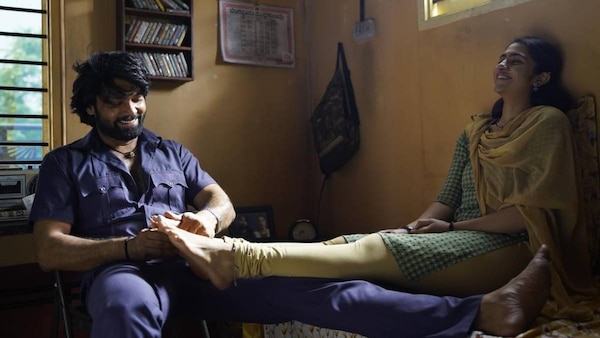
When did you know you’ve crossed the finish line?
After the paid premieres. By Friday afternoon, I was like — the film will find its place, the producer will make his money, I don’t have to worry, and we are okay.
What about the audience reaction has moved you?
I’ve been moved by the overwhelming connection the audience seems to have made with the film at a very visceral level. They have allowed Manu and Priya to step into their hearts. People are creating new art and poetry, moved by the film, and that’s touching.
I made the film as a consequence of many stories that have stayed with me, that moved me. To see others react that way to my movie is a beautiful process.
Have you ever been moved thus by cinema?
I’m a sucker for such an experience, and my adulthood was about falling in love with different stories. I watched Cinema Paradiso about 18 times. I’ve watched Children Of Heaven numerous times. And so many Indian movies. My perspective on life has changed because of some characters, and I have always aspired to make films that can have even a tiny effect like that. I wanted to make stories that can have that impact on someone else. That’s something one always works towards.
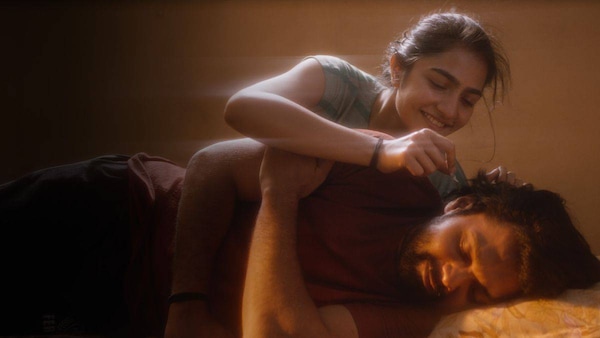
A two-part film in such close proximity is a rarity, and you had your plan in place. What was this process like?
I think this was when we were shooting the jail sequence in Shivamogga, and just before the schedule, I was doing the math. As a producer, Rakshit trusts implicitly, and I was doubling down on costs. I knew I wanted to shoot some more, knowing I might not be able to retain much in the final edit. By then, I already had about five to six minutes of spare footage, and if I shot for another 15, I’d have 25 minutes. I decided against shooting it, though I was trying to tell something important in those scenes.
I thought of a two-part film and bounced the idea to Rakshit. He was amazing as a producer. He told me to shoot the film the way I wanted to, without worrying about anything, because we were well within our budget, and finally decide on the edit table. That freed me up. When we saw the movie, we sensed the two parts would work.
Your films have always been about the small, beautiful things. How does life inspire you?
I am an observer of life. I steal from life, left right and centre. There are so many things you pick up by just seeing and being amid people. Earlier, I would do it consciously, now it’s something subconscious.
When you see, you understand people come in different shades, and the colour changes depending on their point of view in a certain situation. In my book, the real villain is the manager played by Achyuth Kumar sir. There are so many people who are casually careless, little knowing what hell they are condemning people to, just because they want to further their interests.
Did your research for the prison sequence change your perception about a lot of things?
In some ways, it was a fount of positivity. I feel that it is a fundamental human trait to have some hope in the worst of times. It is there in all of us. That makes life beautiful.
In prison, I interviewed people who have been incarcerated. I met many different people, different characters. A music teacher who was convicted of a triple murder. Who was I standing in front of? A cold-blooded killer or someone who passed on the gift of music to his fellow convicts? In the factory, people work, locked away and far from people’s eyes, but they are still people and speaking to them showed me the reformatory side of prison.
We are often shown prisons to be a certain way, and this blew my mind. That line about real imprisonment is living with yourself after having screwed up came from there. Society has locked some in prison, but that prison is just a construct. Living till the end of your life knowing you’ve made mistakes, caused pain, that’s the real punishment. That is a very difficult burden to carry.
Writing these portions was difficult, because you’re writing about something that is intangible for you, in terms of experience. It is outside the realm of your understanding. So, I had to be extra careful to not go wrong there.
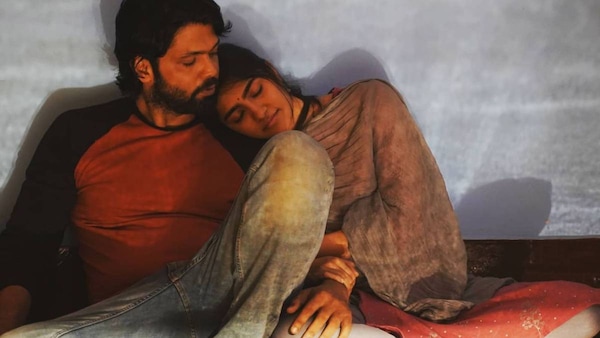
Manu and Priya are each other’s safe space, each other’s home. Their yearning to be with each other is heartbreaking.
I think this is an emotion that is natural when you are in love with someone. There are days (away) from home when I can’t wait to come back to my wife, and my dog. Wanting to be with the person who gets you is a very real feeling, and I think that’s what we tried to project to the lead characters too.
Subscribe to our newsletter for top content, delivered fast.
